The farming life for us
Well, the deed is done; we are now the proud owners of a rundown French farm cottage, which will forever be called the pig farm, and have started on the long and arduous task of converting it into a dream retirement retreat. We have also added a new phrase to the lexicon of English idioms; any form of hard work is now called pig farming, as in "I'm knackered after pig farming the washing all morning."
It has taken some patience to get from when our offer on the property was accepted in mid-June to mid-October, when we finally got the keys. However, whilst long winded, the process has been much less stressful than for any other property we have bought. In France, the whole real estate process is managed by a lawyer called a notaire, who, for the purposes of property conveyance in employed by the state.
The notaire carries out all the conveyance work undertaken by the vendor and buyer solicitors in the U.K., but on top of that, they ensure that all property and tax laws are complied with and that inheritance rights are protected. If you sell a property and have children from a previous relationship, then the notaire ensures that any rights they have to proceeds from the sale are fulfilled and if you owe any property taxes, then these will be deducted from your proceeds. Whilst all this at first seems overly bureaucratic, in fact it makes the process much less confrontational and ensures that gazumping by the seller and last minute pressure by the buyer to reduce price cannot take place. The price and the main points of the contract are established early on and signed for by both parties, before any conveyance starts. Any backing out by either party that is not occasioned by conveyance revelations or death carries a financial penalty.
You need a 10% deposit at the point of the signing of a document called the compromis de vente, which sets out the terms of sale as understood by everyone at that point in time. It has attached to it all the survey reports that French property law requires, which are paid for by the vendor; kind of like the house pack that the U.K. government has just scrapped.
As a buyer you can also insert all sorts of conditional clauses into the compromis, relating to such things as mortgage acceptance, or whatever. After that, the notaire, who holds all money, carries out all the necessary searches and draws up the final act of sale. We put in a bit about joint ownership, important in France because of the inheritance laws.
We received the compromis de vente in England and spent a hectic couple of days translating it. It was at this point that I began to appreciate the correctness of my decision some thirty five years ago to marry someone trained in classical French. It is one thing to transliterate French words into English with the help of a couple of dictionaries, but it's another thing entirely to understand the complexities of French legal language, for that you need Camilla, who could hold a reasonable conversation with Cardinal Richelieu. We duly initialled each of the forty odd pages, wrote out a declaration in French and signed it. I felt a bit cheated after all that work that we weren't asked to press our seal into it.
Cami meets a lot of dogs
At the point when we signed the compromis, Cami hadn't seen the farm. Seen photographs, yes; heard my descriptions, yes; but actually walked around our half acre of paradise, no. Work commitments leading up to retirement kept her nose to the grindstone. The first day she was free to make a visit was one day after our seven day cooling off period ran out. This was a little worrying and, now that I am running on exercise and water, I couldn't even dull the anxiety by brushing my teeth with a bottle of Jack, as the song says. But we have bought a fair number of houses so I was reasonably confident of the outcome.
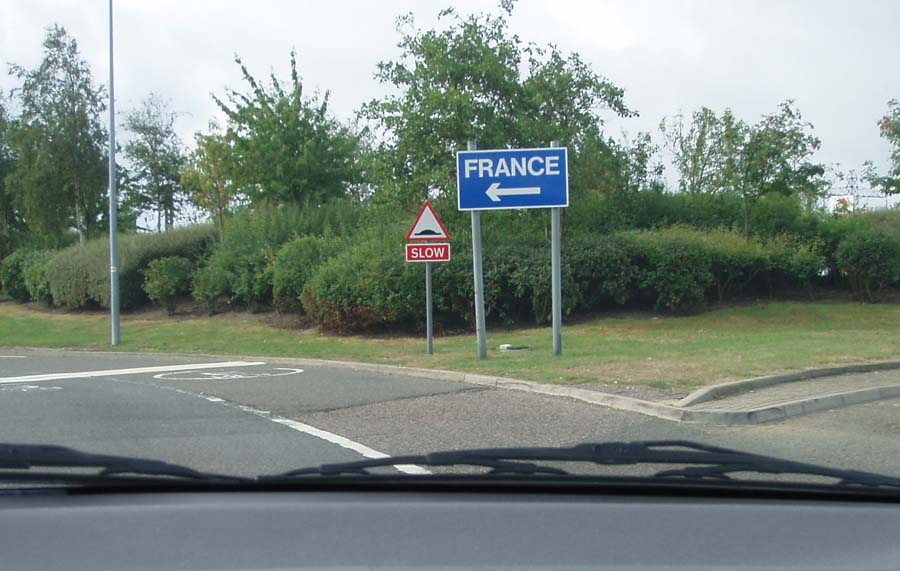
In the beautiful hot weather of August, we motored down to Limousin in Cami's Honda Civic to introduce her to the house, the neighbours and the area. I tried a new route as I didn't fancy battering my way round Paris during the traditional French holiday month, when all of les automobilistes dimanche (Sunday drivers) would be on the roads at the same time. We went via Ruen and Chartres, where we broke the journey for the night. As we were coming into Chartres we drove along a dead straight Roman road with completely flat land either side running away for miles and I am sure that this is the road we traversed fifty years ago, when I first visited France. At that time I was on a motorbike and we had to lean the bikes over at quite an angle to avoid being blown off the road by a gusting side wind. There is one short stretch that has not yet been improved to dual carriageway and Cami thinks they kept it like that specially, so that I could drive down it and recapture a tiny part of my youth. They even rustled up a bit of a side wind for me.
Once in Le Dorat, we stayed in the slightly worse for wear, but still very friendly and genuinely local La Promenade hotel, where I had pitched up on my first visit. The room smelled of smoke, despite the défense de fumer signs, but a couple of hours with the window wide open soon freshened it up. The food was as scrumptious as I remembered; no good for vegetarians, but great for us eaters of animal bits; all of the animal bits, from head to tail.
We had arranged through the estate agent to meet the vendors at the property, so that Cami could look around and we could measure everything. At the appointed time, we drove down the farm road and were met by a cacophony of barking and yapping. Now, I knew that there were dogs in the hamlet, but I hadn't realised just how many.
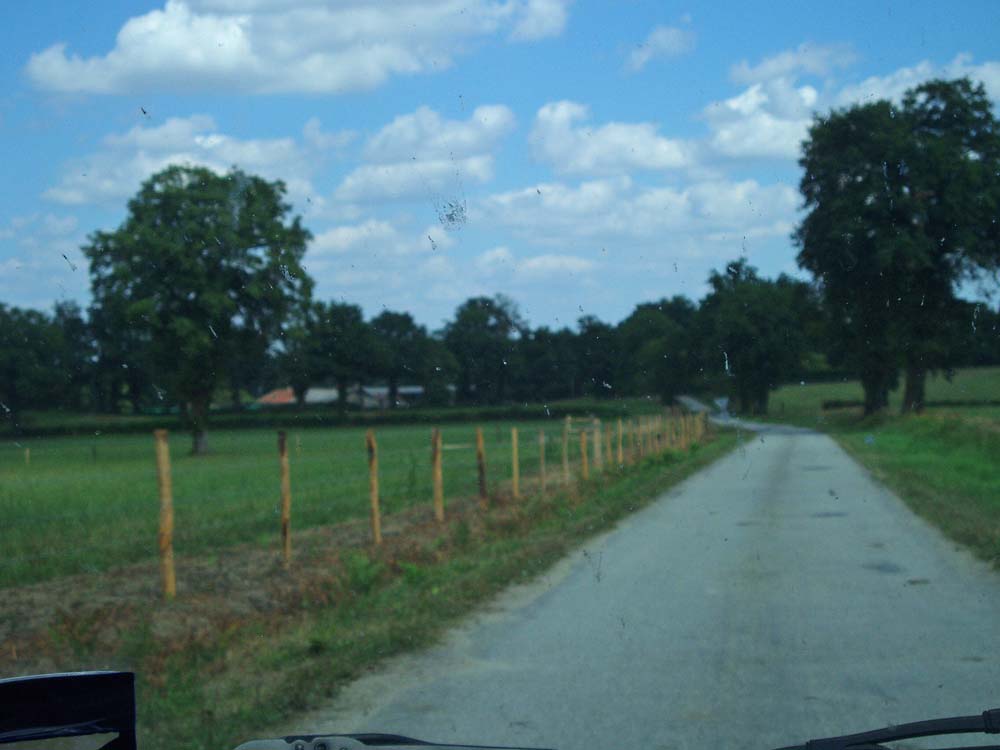
Three terriers leapt from the cottage on the right, a pack of a dozen beagles let loose from a kennel enclosure, the three old farm dogs raced madly round the car and two more ancient terriers burst out of the house at the end. Dogs outnumbered humans by two or three to one in this hamlet and were clearly in charge as not a single human had appeared as a result of all the noise. Now I'm O.K. with dogs, but Cami is a cat person, so there was a little sinking feeling, but the situation was rescued by a daft old Collie cross we later found out was called Dolly. As soon as Cami tentatively opened her door, Dolly gave her all in a performance of "I'm the most beautiful dog in the world and all I need is love, love, love." A little petting of pack leader Dolly and the rest of the motley crew went quiet and lined up for their turn. Phew!!
Just behind us, the family member who had been picked to face these strange foreigners, pulled in; our neighbours then appeared and we were soon all introduced. The farm, of which our cottage is part, is owned by six members of the DeCressac family and, until recently, was managed Gerard DeCressac, who lives next door to us with his wife Yvette.
It is typical in France for property to be owned by many members of a family as the concept of primogeniture is rarely applied since the revolution. The DeCressac spokesman was M Chateau, the husband of one of the DeCressac sisters and it was clear why he had been chosen. He was a lively carriage maker with a sharp sense of humour, who could clearly hold his own in any gathering.
Gerard and Yvette were more reserved at first, but soon succumbed to Cami's fluency in their language and happily showed her round the place whilst M Chateau acted as my surveyor's assistant, writing down measurements on my pre-drawn room plans whilst I pointed my laser range finder all over the place.
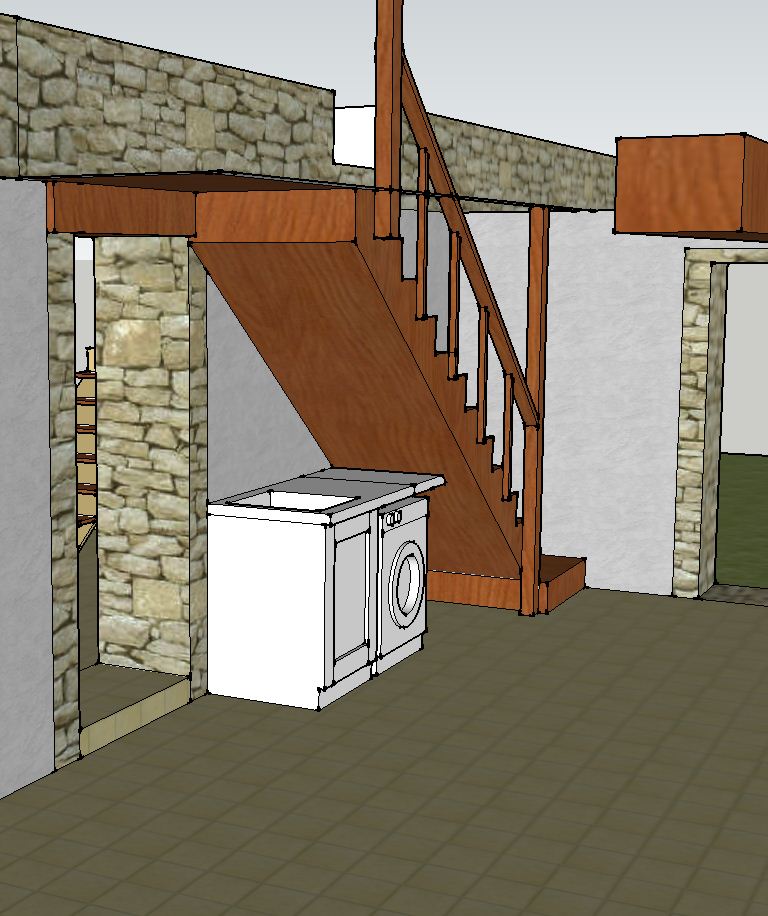
I established a very important point for our renovation efforts. As I suspected, the large cupboard in the kitchen/living room means that, over a doorway sized area, the majority of the wall between the kitchen and cellar has been removed already, so we only have about 100mm to knock out before we break through. Of course, we break though into the middle of a staircase, but a quick Sketchup session using our verified measurements has shown that we simply need to spin the staircase through 180 degrees to turn the cellar into a very practical scullery. The key here was the measurement from the kitchen wall to the main beam that supports the cellar loft and is a bit low to duck under. This turns out to be 2.4 metres, which makes a wide enough space to create a scullery and passage to a new back door, without the remodelled staircase making the space look too cramped.
After a couple of hours which tested my very limited ability in French conversation way past its limit, us men all shook hands, the women kissed Gallic fashion and we headed back into town, where I had a delicious ice cream. Blackcurrant sorbet with cassis poured over, perfect on a hot day. It was at a little café in the main square, which is clearly going to become a haunt in hot weather as it has a goodly selection of quality ice creams. I will just have to burn off a few extra calories knocking over pig pens to make room for them.
Aladdin's cave
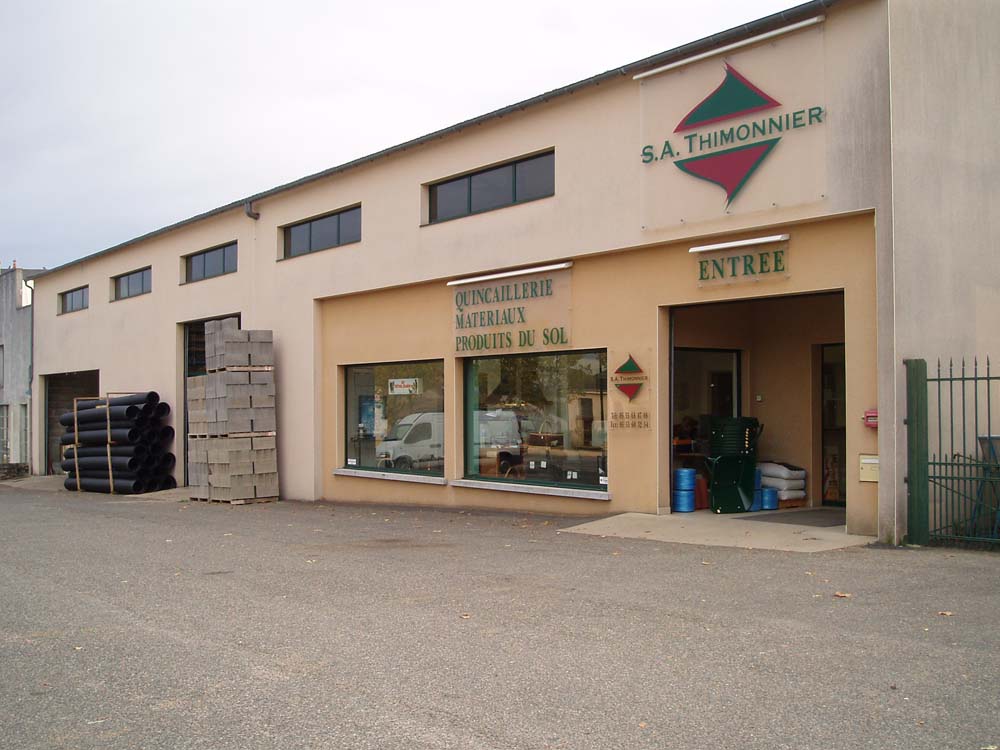
Prior to our measurement session we took a morning tour of the area and stopped in Bussiere-Poitevine, where I spotted a hardware shop. It wasn't so much a hardware shop as Aladdin's cave. Everything from flower pots to generators, from jam making pans to drainage pipes and more shutter hardware than I could ever have imagined. Shutter hinges, fixed or removable, in ten centimetre size increments from twenty five centimetres to over a metre and all sorts of shutter catches and shutter locks. A whole shutter industry, which is completely missing from England.
We used to have hardware shops like this in England. I remember one in Brighton run by a tall, thin, silver haired lady. It had unpackaged circular saw blades hanging on a bit of sting over the counter and you had better know exactly what screws you wanted, because she could reel off dozens of different types and sizes. Then one day it was gone. There was still a shop there that said it was a hardware shop, but instead of a dark and crowded cave, it was bright white, with everything neatly arranged and sealed in plastic. I could have cried. It's good to know that she didn't disappear; clearly she simply decamped to the Limousin and who could blame her.
Market views
We later stopped in Bellac and had a quick look around the Saturday market. Well I looked and Cami gazed in rapture. A flying pig in shit would be a fairly accurate description and I am amazed that we came away with only a melon and a bag of some sort of plum that you can only get in France apparently. I was tempted by the Opinel knives, just like the little girl in the photo, but I have a couple already, so couldn't justify any more. Opinel's have a carbon steel rather than stainless steel blade, which means they stain and are easily damaged, but they take an edge like a razor and, around the garden, are the most useful tool you can carry.
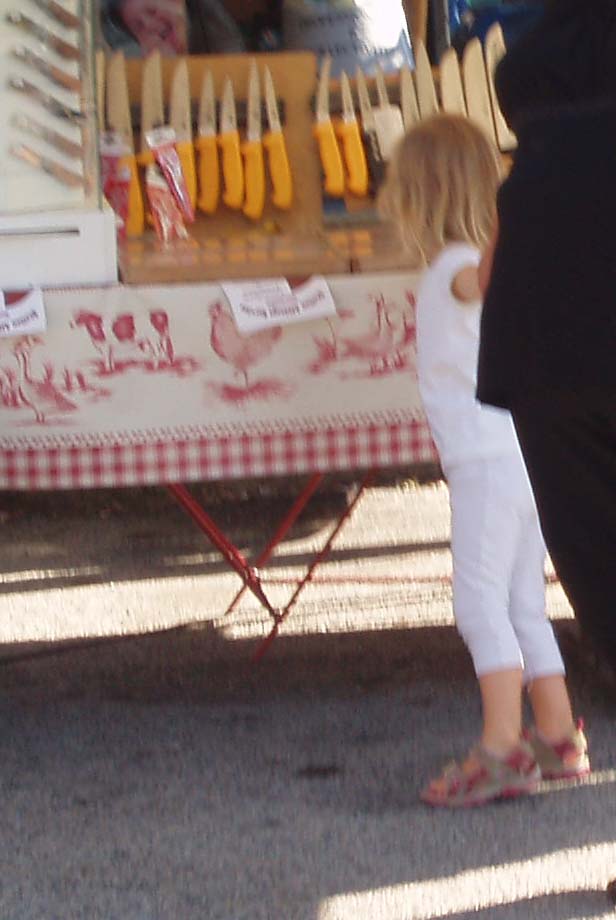
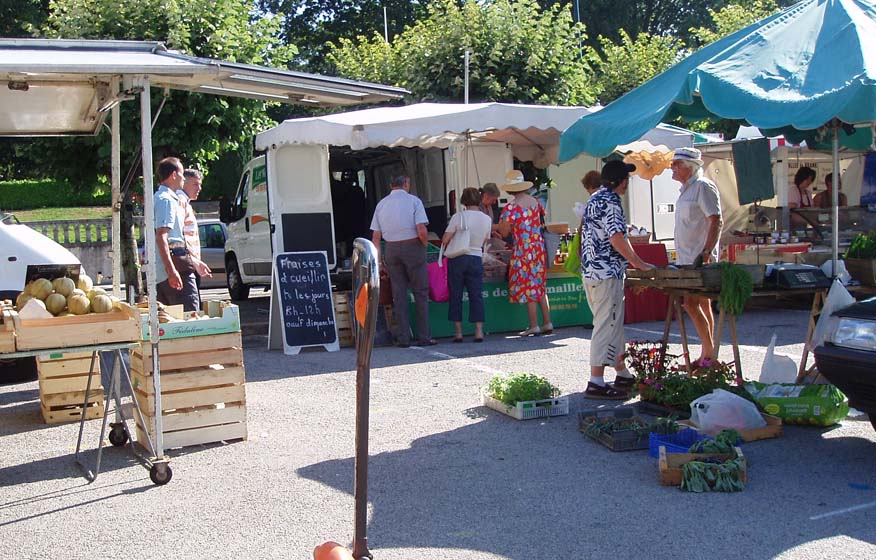
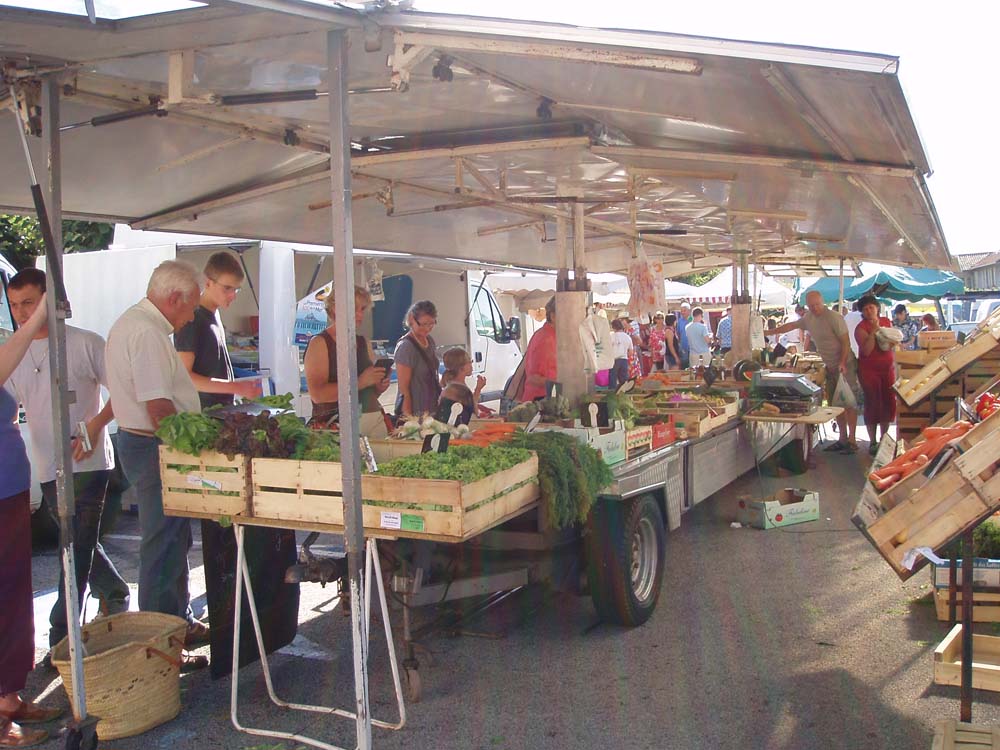
Coffee in a local bar was delayed somewhat by a pushing and shoving type argument between the barkeep and, I suppose, a customer. Interestingly, and differently from England, other customers rushed in to help the barman instead of rushing away and they politely said excuse me to us as they rushed past. All over in seconds, with disgruntled customer storming off down the street and everyone else resuming their sitting in the sun sipping drinks; except for the kids, who hadn't noticed anything going on as they were too engrossed with winnie the pooh on the wide screen telly. The coffee was good, although the barman thought Cami was mad buying a hot milk and a café noir and then mixing them. If she does that in enough cafés in the Limousin, I can see it starting a trend. We could call it a latte and who knows where that will lead: Cappuccino? Americano? Fudge brownies? We could destroy French café culture in one generation. I should point out that in the cities and big towns, Starbucks and Costa have already invaded, but here in the country there are still just café noir and café au lait and the locals would rather you spat in their coffee than sprinkle it with chocolate or cinnamon.
We stopped in an aire de repose for a picnic lunch and watched a macho family driver back into a large rock. He had entered the aire too fast, narrowly missing a family crossing to their car, stopped in a cloud of dust and then proceeded to reverse with some velocity. I quickly calculated his direction of travel and the position of the rock and smiled. Sure enough; a loud bang and the rock moved. Unfortunately a towing ball on the back of his car protected his bodywork, but his rear suspension geometry must have been a bit bruised. He got out, kicked the rear bumper, presumably blaming it for not seeing the rock, got back in and drove off even quicker than he had entered. An amusing few moments and it gave the madames present a good excuse for some shrugging, head shaking and tut tutting, which they are very good at.
Rocking out of France

The area around Le Dorat is a renowned centre for horse breeding and on Saturday night they had a party to celebrate the end of some national horse jumping show. We could hear the show jumping crowd enjoying themselves to the strains of French rock and roll from our open window. French rock and roll sounds like English rock and roll sounded, when we had rock and roll instead of rap crap, except for a Louisiana twang in the vocals. If I were incurably romantic, I would hear the sound that the Arcadians contributed to southern Blues and country rock. Around two o'clock, the music stopped and lightening started playing across the sky. No thunder, just vivid steaks racing across the sky, a real Ozzy Osbourne end to the night.
We motored back to England the next day through pouring rain and the aire we stopped at was a real mess. Masses of dripping people crowded into a small shop and toilet area and a men's toilet that was blocked, with only the disabled cubicle open for business. Now women come across toilet queues all the time, because they take forever to complete their ablutions, but men are used to a quick unzip, squirt, shake and zip up again, finishing up with waving our hands somewhere near a sink. The whole operation is over in seconds, so that we can spend the next ten minutes pulling in our bellies as the jeune filles waltz by, whilst waiting for those of our companions who have read about hygiene.
The idea of a queue for a mens toilet is so alien, festival goers aside, that we have no idea how to form one. We ended up with a ragged half circle that pressed ever tighter together as we peered at the guy trying to unblock the drain and mentally cursed his incompetent efforts as we squeezed our bladders and bit our lips. Eventually, we all passed through the disabled cubicle, except for those who gave up and braved the rain to find a quiet bush. Cami reported that the women's toilet was being offered to any man who wandered near, but there were few takers. Am I surprised? Imagine, having to queue with a lot of women and kids for a toilet, never: not when there is a bush in the pouring rain.
The Interregnum
And then we waited - and waited - and waited - and waited. Between August and October we must have been travelling at near to the speed of light, because time slowed right down and each day dragged on for months.
Camilla finally retired in early September and we decided to take a short break touring Scotland in a camper van. Big mistake. Buying a camper van was one of our "we might do this when we retire" ideas, so we saw this as a trial run. The cost of hiring the van was huge and the van itself was old, noisy and very very slow. On the way up north, we were passed by a fully loaded Eddie Stobart wagon going uphill. Once there, we found that the bed was unsleepable, the chemical toilet didn't work and the van was too big to park comfortably in any small village. So we drive up on day one, fail to get any sleep and decide to drive back the following day and chuck the van back. We will eventually forget the £1,000 we spent on van hire and diesel in order to eat an ice cream in Scotland. The ice cream was good though. We have been lucky with ice creams this year, but this one was a little expensive.
And then we waited - and waited- and waited - and waited. Some recent research appears to show that the laws of physics aren't the same everywhere in the universe. Perhaps I could get them to come to Reading to investigate the time distortion. I questioned everyone locally, to make sure that no one had pricked their finger on a spinning wheel recently.
Our apple crop was low on quantity this year, but the quality was good and our little pear tree outdid itself, producing about 3 kilos from a spindly plant barely five feet tall. I am going to give it a gentle trim and a good mulch of manure this winter to allow it to recover. Runner beans were a success, but it is difficult to get green bean growing wrong, just support them and keep pouring water over them. I need to think very carefully about how to manage my veg plot in Reading next year as we will be spending most of the summer in France. The fruit trees should be fine, but raised beds and soft fruit do need attention, so I am going to have to plan short trips back at critical times. The fruit and veg will thus work out more expensive than if we bought them in Fortnum & Masons, but they will be home grown and by the following year we should have moved food production to Montgomard.
I had been musing for some time on getting a tow bar fitted to my old Land Rover Freelander. The idea is that we buy a trailer in France and use the rig to bring home from auction the few beautiful - and large - pieces of furniture that will grace our farmhouse kitchen. It can also be used to collect steres (a stere is one cubic metre) of logs for our wood burning stove and to take the copious amount of rubbish we will create down to the local recycling centre, which is handily located a couple of clicks down the D942, towards Magnac-Laval.
As expected, there are quite a few tow bar kits available for the Freelander; after all if you can't tow something with a Land Rover, what can you tow it with? The problem was that I really didn't fancy crawling about under the rear, with muck falling into my eyes and nose and scraping my knuckles on a crossmember whilst trying to free a rusty bolt. On the other hand, taking it to a garage for fitting involves either waiting around or setting up a convoy with Cami.
However, leafing through a Land Rover magazine that I bought at a motorway service area on the way up to Scotland the previous week -- no it wasn't a holiday, all right - I came across an advert for Towbar Express. This outfit offers to fit a tow bar either at your home or your place of work, so I filled out an online quote form. The quote came back at £244 including VAT, for a simple fixed tow ball and single electric output which, when I checked the spec of the kit they were going to fit gave me a fitting charge of around £50. Just as cheap as getting it fitted in a garage and I didn't have to move out of my armchair. The guy turned up around 09:30 and half an hour later, with no fuss or bother, we exchanged some used twenties for a fitted tow bar with the electrics wired up; brilliant. Is there anything you can't do through the internet, apart from sex and drugs of course?
And then? Oh yes, there was some more waiting.
The final act
Finally the news came that the notaire was ready for us to sign the final act of sale, so in early October we stuffed the Land Rover full of demolition and land clearance tools and headed for Limousin, to put up in a gite in Bussiere-Poitevine, some fifteen kilometres from our house in Montgomard.
I think that the attraction of the gite was that it was just across the road from our favourite hardware shop, so we hadn't checked that it had anything like central heating, or a washing machine. There were some beautiful sunny days, but the nights were cold and our only source of heat was an old wood burner, which threw out a lot of heat, but only for about eight feet. Still, we adapted and I was able to practice my wood stove management technique, which was much easier than managing the coal fires I remember as a child. We also discovered the Laundromat in Le Dorat, handily placed across the square from our soon to be favourite café.
The final signing was as stress free as the rest of the buying process had been. Four of the DeCressacs, Cami and I and the estate agent all sat round a large table whilst the notaire went through the contract of sale, carefully pointing out and explaining the joint ownership of part of the roof that we had with our neighbours and the right of way that was being created over the farm entrance so that we could reach our front door. We poured over local authority plans to make sure that no unexpected wells sat on our land, nor footpaths crossed it. The price and all associated fees were documented, with the share going to each of the DeCressacs, the notaire, the government tax office and the estate agent being detailed.
Finally, after about an hour and a half, we all signed and cheques were distributed. I had followed about half of what the notaire was saying, which pleased me and John, the estate agent sitting next to me, had translated the rest. Cami of course carried on an animated discussion with the notaire the whole time, which impressed him greatly. The French must get very tired of ignorant English people buying up their country and seem overjoyed to meet someone who understands them perfectly. It's funny, they know she was born in Paris, but they also know, from her accent I guess, that she is English.
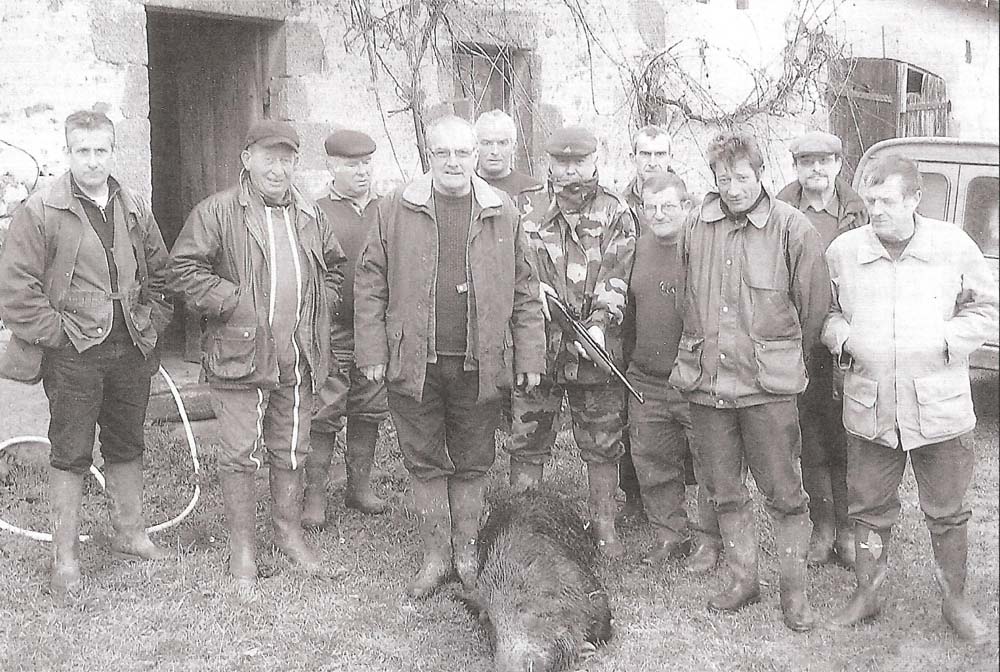
After it was all over we drove back to Montgomard in beautiful bright sunshine to partake of an aperitif with our new neighbours Gerard & Yvette. Champagne mixed with Cassis was passed round and we exchanged the first details of all our different lives. Gerard is passionate about hunting and can be seen in a photo of the Dinsac hunting club that appeared in a local magazine we had picked up the day before from the Mayor's office. He is second from the left in the picture.
Yvette is house proud and keeps the dust and mud of the farm firmly at bay with a selection of brooms and mops stored by the front door. Once we were all safely inside the living room, a broom was selected with the care of a gunslinger and the entrance and front step carefully denuded of any trace of nature before she sat down.
The family have farmed here for generations and have some beautiful old photos of family gatherings. The fact that Gerard has sold off most of the farm and retired does not mean that he stops work. He is now working on his son's farm nearby. He shrugs, "What can you do?" I think we are going to get on with them very well and who knows, I might even get invited to join the local hunting club, which is apparently a great honour our landlady at the gite was telling us.
The other members of the DeCressac clan who shared aperitifs with us were Bernadette, Gerard's sister, a retired president of the local Lamb guild, her husband Daniel Chateau, the carriage restorer and part time survey assistant we had met earlier and a much younger brother, Philippe, who is a cabinet maker by trade. A family of rural artisans; probably representing one of the last generations of such people. I am going to have a great time teasing out their story over the next few years.
Over the following two weeks we started on the administrative side of owning a house in France and this was another revelation. We had heard all the usual horror stories of how impossible it is to get anything done in France, but for us, the seas divided and we walked through the administrative maze with dry feet. It's Cami. Everyone is firstly charmed by her and then slightly scared as they begin to realise what a powerful intellect they are facing. Bullshit disappears, vague promises turn into firm commitments and their explanations suddenly become clear enough for even me to understand.
So, we now have house insurance, a bank account with internet access, electricity and water accounts, with bills sent to the U.K. and even agreement from the local planning office that we can knock down as many pig pens as we want without a demolition permit.
The French nation as a whole did their best to welcome us to their bosom by organising a series of strikes, demonstrations and oil refinery blockades to protest against pension reforms, the result of which was that France ran out of Diesel. Well that was what the media would have you believe.
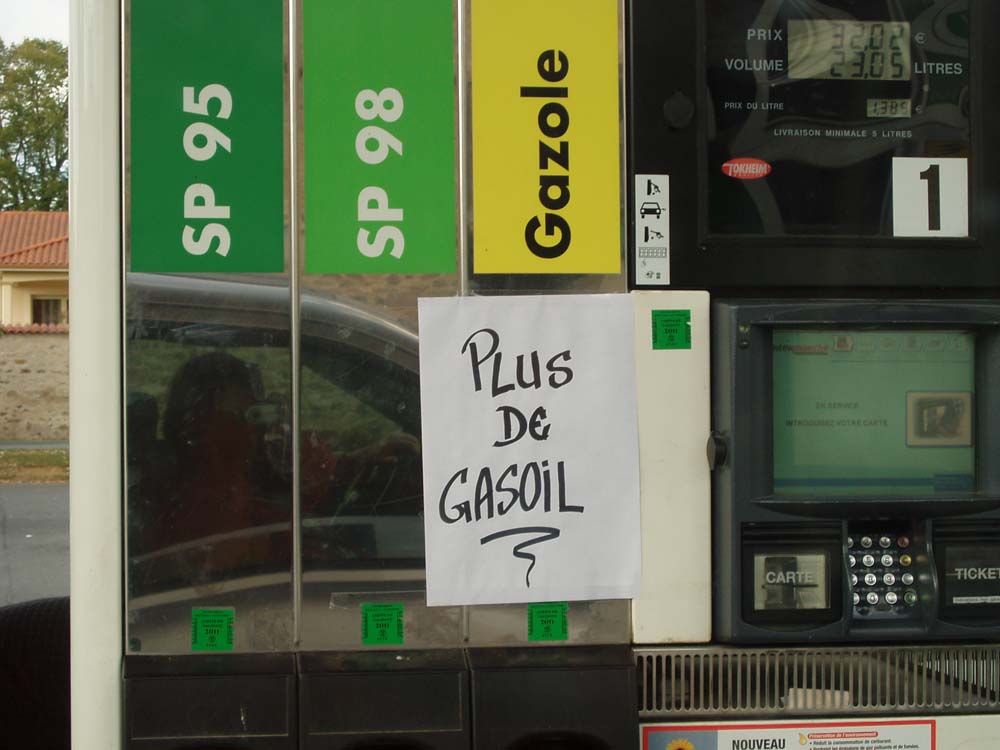
We were a bit short one day, but that was only because we had passed up a chance to fill up the day before. The local service stations that did have deisel handled the situation in a calm fashion, rationing you to 20 Euros worth a day, so by the time we were ready to set off for Calais, we had close to a full tank.
I have always admired the French for their willingness to exercise their right of protest, particularly as they manage to do it with passion but without the bitter recriminations that occur this side of the channel. The current recent crisis in the U.K. may well have taken a different turn had we started oiling the guillotine and rolling out the tumbrels, instead of meekly accepting that it was all our fault.
The game begins - once we get past the cows
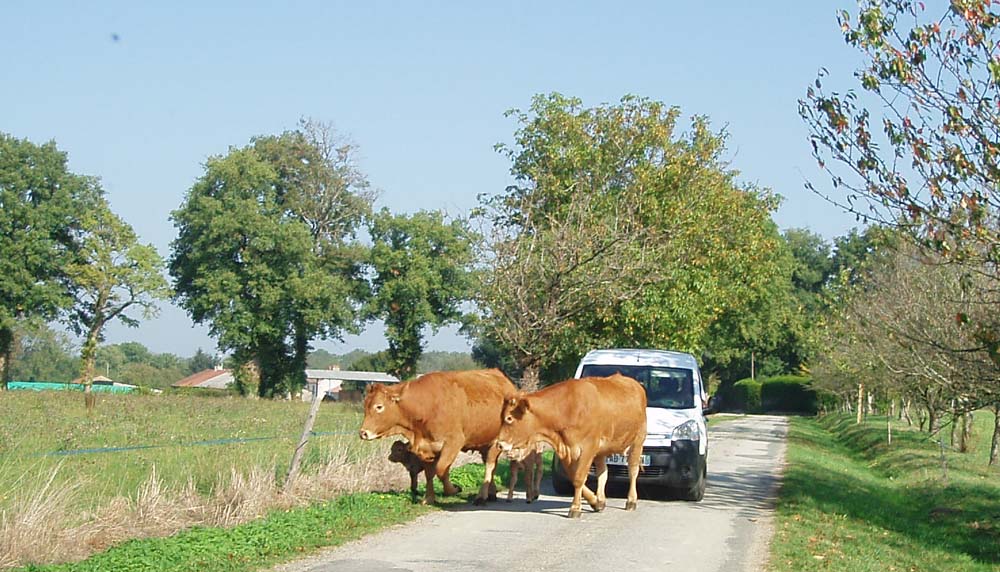
One of the major things we achieved during our October visit was to start on the renovation work. We are installing a septic tank rather than a micro sewage plant as the economics work out much better for a small family. I carried out a soil porosity test and we definitely need a sand filter. For the first 200mm the soil is a sandy loam, but it then changes to solid clay, so dry and hard that nothing can get through, the odd result of which is that the soil drains better when it is wet than when dry. Good job I built the price of a filter into the budget.
We have found a local installer, English like many in the Limousin, but with French accreditation, so we get the standard ten year guarantee and he is starting on the paperwork for a permit. He can do the whole job without us being there and we can pay him when the job is done and passed by local inspectors.
We have also found an electrician for the rewire and he, like Cami, is a Frenchman who was brought up in England, so I can go into electrical circuit details with him. I won't bore you with the beautiful logic of French electrical regulations, but once again Sketchup has proved its worth in allowing me to produce circuit diagrams for him and he is more than willing for us to carry out the labouring jobs like channelling out the walls to keep costs down. I have got 500 Euros in the budget for diamond cutting blades for my angle grinder as we may well be channelling into granite to get wall sockets up to the correct height. We will also be channelling down into concrete to get the cabling along the walls. I will then engineer some skirting board in suitably beautiful timber to cover it all up. Simple, as the meercats say.
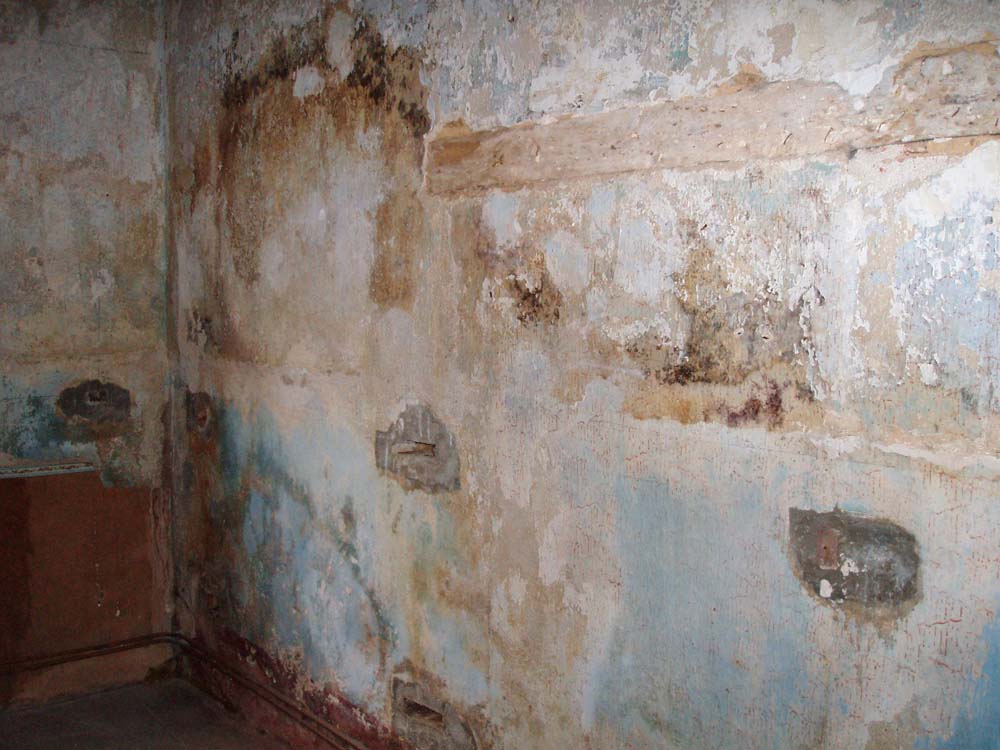
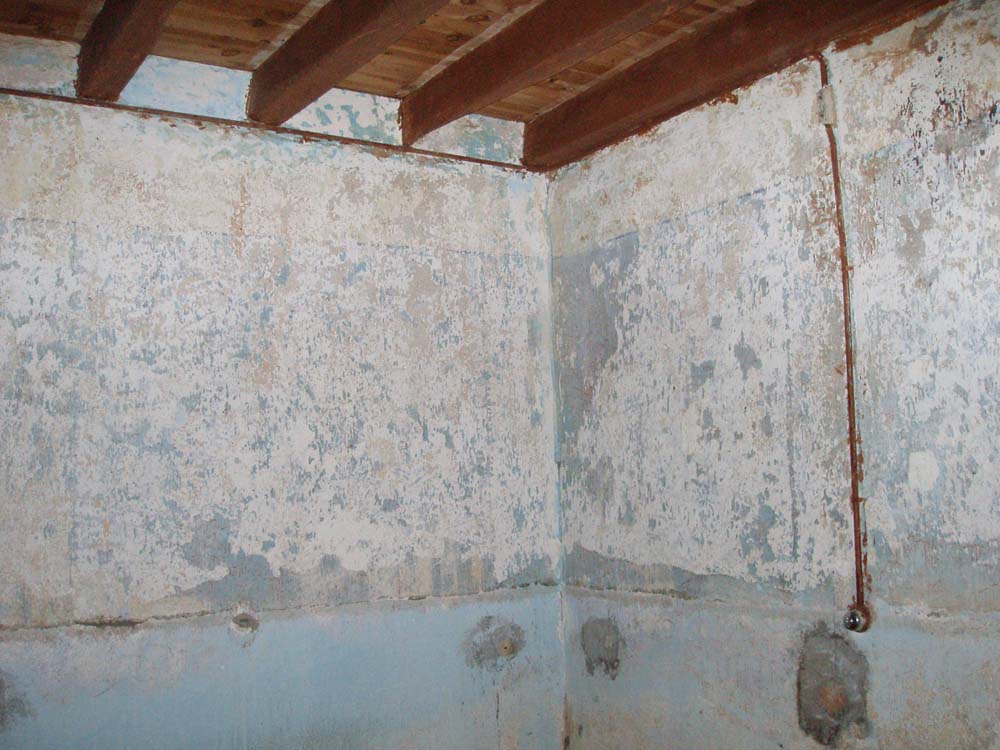
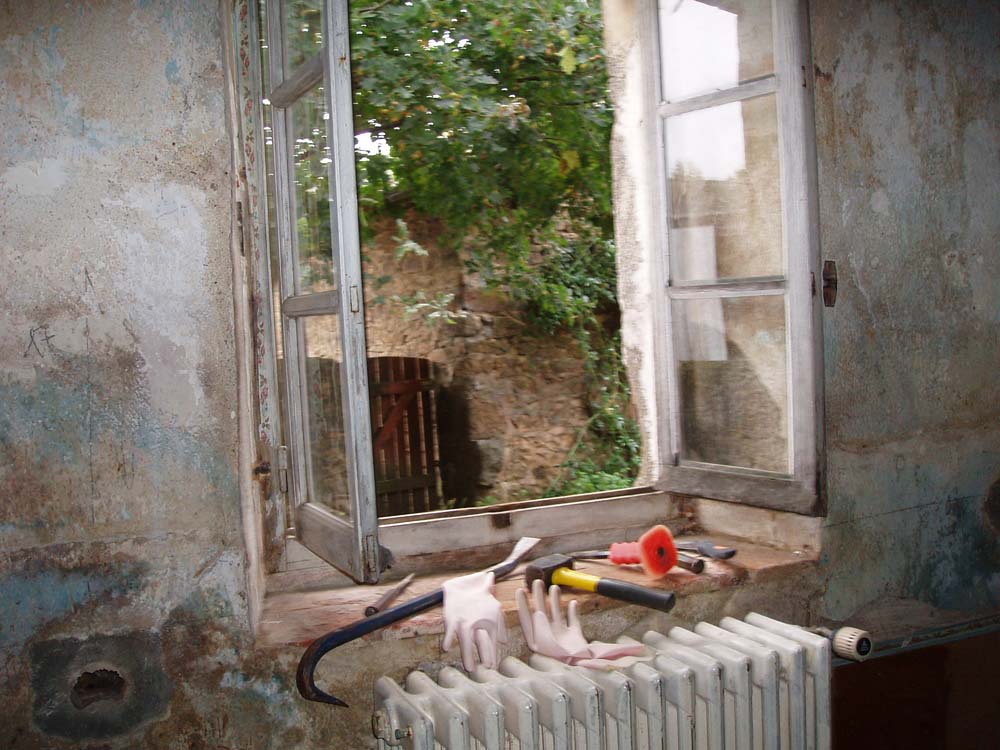
We also ripped all the old wallpaper and skirting boards off and gouged out most of the degraded plaster in the main kitchen and two of the bedrooms. It is criminal what people have done to old houses over the years and the pig farm is a perfect example of how not to modernise a 19th century building. It is built of large granite stones, with beautifully dressed limestone at the corners, all held together with lime mortar, but it sits directly on the earth, so moisture, which can't touch the stone, wicks up through the mortar.
The volume of moisture is not great and the traditional lime plaster interior wall covering will easily release it into the air. However, cover that plaster with vinyl wallpaper, several layers of vinyl wallpaper, and you are asking for trouble. The wall can't breathe and moisture builds up inside it, giving that musty damp smell. I am sure we could hear a sigh of relief from the walls as their sweaty plastic covering came off. In one of the bedrooms, things were even worse, as the bottom half of the walls were covered in asbestos sheets, so the walls behind were actually wet.
Fortunately, it is impossible to degrade granite and very difficult to damage lime mortar, some of which has survived from Roman times, so the walls will recover and, in fact, the ones we did first were already dry by the time we left. We now need to remove every scrap of modern plaster and cement, treat any damaged timber beams - timber is used for lintels over the doors and windows - and use only lime plaster and lime paint to cover the stone. Such materials are very easy and cheap to get hold of in France, so one of my many money making musings is to fill up the truck with traditional plaster and paint and bring it back to the U.K. for resale. They are sold to the listed building crowd here and thus command silly prices.
All in all a very successful trip and we were treated to an early morning Turner sky on the way back. Cami's getting quite good at these shots from a moving vehicle don't you think.
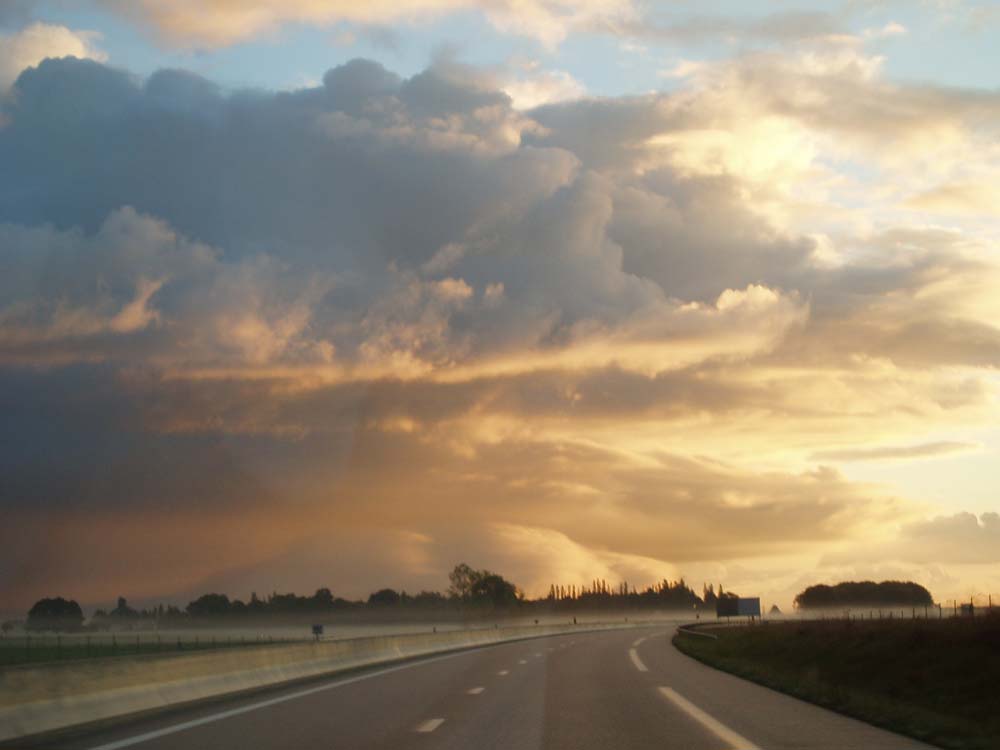
Last updated 10 November 2010